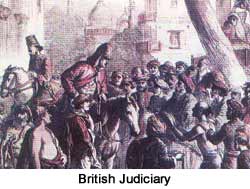

 |  |
Lord Cornwallis, who was appointed governor general of India in 1786, had earlier server as a British general in the American Revolution. The British Parliament had passed Acts in 1773 and in 1784 to bring the East India Company under the control of a British government minister. Lord Cornwallis was given the task of reforming British administration in India and of establishing good relations with the Indian princes. He set up an independent judicial system, prevented the company's government servants from conducting private trade and holding government contracts, and reformed the police and criminal justice system.  Cornwallis's greatest achievement in India was the reorganization of the land taxation, known as the Permanent Settlement of 1793. Agricultural land in Bengal was cultivated by a large number of small farmers, who paid rent to a group of zamindars (landowners). Under the Mughals, the government had collected taxes from the zamindars. The East India Company, however, had tried to set aside the zamindars, and collect land taxes either directly through company officials, or through revenue-farmers, who collected the rent from peasants and paid a lump sum to the government. The new system led to widespread corruption, and the peasants suffered severely. Cornwallis decided to go back to the old Mughal system. He granted legal ownership of their land to the zamindars. In return, they had to pay the government 90 per cent of the rent which they collected from the farmers. These arrangements were to last for ever, hence the title "permanent settlement."
Cornwallis's greatest achievement in India was the reorganization of the land taxation, known as the Permanent Settlement of 1793. Agricultural land in Bengal was cultivated by a large number of small farmers, who paid rent to a group of zamindars (landowners). Under the Mughals, the government had collected taxes from the zamindars. The East India Company, however, had tried to set aside the zamindars, and collect land taxes either directly through company officials, or through revenue-farmers, who collected the rent from peasants and paid a lump sum to the government. The new system led to widespread corruption, and the peasants suffered severely. Cornwallis decided to go back to the old Mughal system. He granted legal ownership of their land to the zamindars. In return, they had to pay the government 90 per cent of the rent which they collected from the farmers. These arrangements were to last for ever, hence the title "permanent settlement."
The immediate effects of the permanent settlement were not good. In 1769 Bengal was devastated by a terrible famine. A large number of rural people died from starvation or fled from the countryside. As a result, zamindars found it difficult to collect rent from such ruined farms. Many of them were unable to pay their fixed taxes, and sold their estates. It was not until the beginning of the 1800's, when the population began to increase once again and land which had gone out of cultivation was brought back under the plough, that the great Bengal zamindars again became prosperous. Lord Cornwallis is famous for dealings with Tipu Sultan. He is credited with the defeat of one of the major danger to the British hegemony in India, Tipu. next page >> |
Copyright ©2000 indiansaga.info. All rights reserved.
By using this service, you accept that you won't copy or use the data given in this website for any commercial purpose.
The material on indiansaga.info is for informational & educational purpose only.
This site is best viewed at 800 X 600 picture resolution.